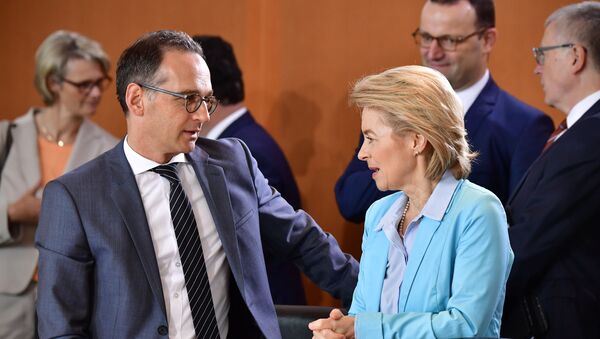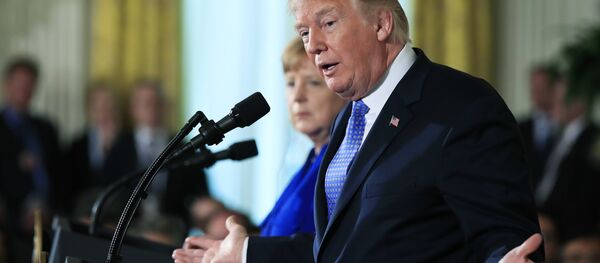In an all-encompassing speech on Germany's future European policy, Maas has stated that President Donald Trump's office has created a whole new set of challenges for Europeans, adding that the EU should react "robustly" when the US questions its values and interests.
"We Europeans have to act as a conscious counterweight when the US crosses red lines. Where the US government aggressively throws into question our values and interests, we have to react more robustly," he said.
As for the challenges posed by the Trump administration, Maas named the withdrawal from the Paris climate deal, Washington's pullout from the Iran nuclear deal, as well as potential secondary sanctions against European partners and protectionist policies.
READ MORE: Merkel Rebuffs Trump's Trade Deficit Claims, Citing 'Old-Fashioned' Calculations
Maas' remarks came shortly after German Chancellor Angela Merkel responded to Trump's claims of a huge trade deficit with the EU, highlighting that the trade calculations were outdated after Trump took to Twitter to blast other countries making "massive trade surpluses," while the US had an $800 billion trade deficit."
“Trade surpluses are still calculated in a pretty old-fashioned way, based only on goods. But if you include services in the trade balance, the US has a big surplus with Europe,” she said.
Meanwhile, the European Commission announced later in the day that European Union remains committed to working with the United States to resolve the current trade dispute.
"Following the G7 meeting, [European Commission] President [Jean-Claude] Juncker offered to keep the communication channels open with the United States, including by going to the United States in the near future. The European Union remains open to work with President Trump on common assessment of our trade relations with the aim to resolve the trade issues in a friendly manner. If and when the visit might be taking place is, however, still to be seen," European Commission spokesman Daniel Rosario said at a briefing.
Over the weekend, the president had strong disagreements with Canadian Prime Minister Justin Trudeau, French President Emmanuel Macron and other leaders ahead of and during the G7 summit, repeatedly accusing allies of putting "massive tariffs" on American goods.
World leaders have been struggling to deal with Trump's new policies on trade, since he announced the introduction of a 25 percent tariff on steel imports and a 10 percent tariff on aluminum imports from the EU, Canada and Mexico. According to media reports, Trump has also considered imposing a 25 percent import tax on European cars, forcing German luxury carmakers out of the US market.
READ MORE: Trump Throws Allies Curveball, Proposes G7 'Zero Tariff' Trade Zone
The president of the European Commission, Jean-Claude Juncker, dismissed the tariffs as totally unacceptable, vowing to introduce countermeasures.



